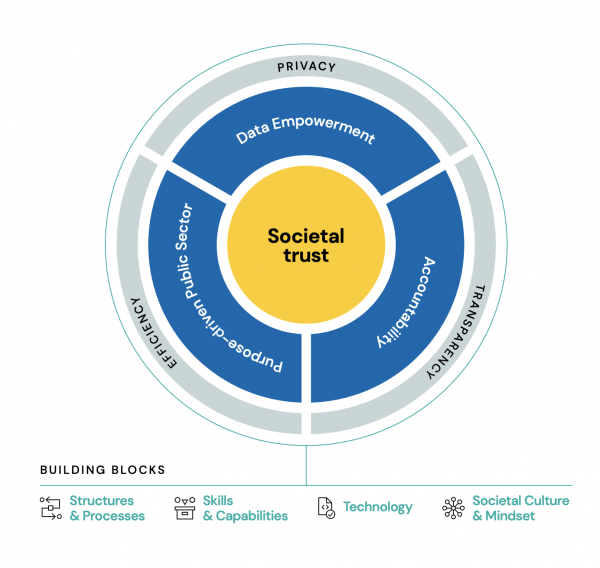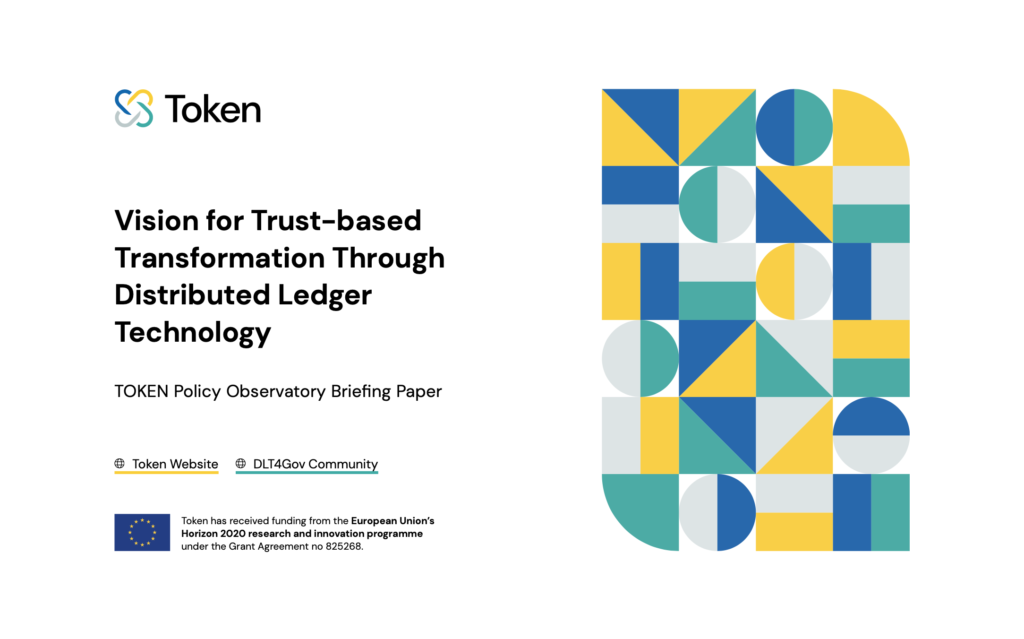This briefing paper is a reflection of the transformative role of distributed ledger technologies (DLT) in the public sector, aiming to support policy-makers and civil servants all over the world to understand the possibilities of DLT in transforming public services and administration, while identifying changes required in the public sector for meaningful DLT application.
This briefing paper is a reflection of the transformative role of distributed ledger technologies in the public sector. It is a combination of a vision statement with the different constituent parts required to move towards the vision. It aims to support policy-makers and civil servants all over the world to understand the possibilities of DLT in transforming public services and administration, while identifying changes required in the public sector for meaningful DLT application.
The TOKEN vision is built from three layers: the vision statement (describing the long-term societal change we want to achieve), the three TOKEN shifts (the desired directions and changes we wish the public sector to pursue), and the building blocks (actions and changes that enable TOKEN shifts to happen).

Key takeaways from the paper:
- Distributed ledger technologies (DLT) create new opportunities to improve public sector capabilities to deliver services and answer long-term societal challenges, building societal trust.
- To grasp these opportunities the public sector should focus on three shifts when implementing and utilising DLT-solutions:
- From privacy to data empowerment – developing not only privacy-by-design solutions, but also creating opportunities for people to know where their data goes, have a say in who uses it and enable the use of data for democratically validated purposes.
- From efficiency to a purpose-driven public sector – instead of solely increasing efficiency via DLT-solutions, focusing on the purposes of the operations of the public sector and creating pro-active, digital services based on life and business events.
- From transparency to accountability – building on top of the increase in transparency offered by DLT to define clear accountability structures and mechanisms for the public sector.
- The realisation of these shifts requires a holistic approach for the public sector to systematically develop appropriate technology, new structures and processes, relevant skills and capabilities and a supportive culture and mindset to utilise new innovations.
The vision laid out in this briefing paper is based on the work and discussions of the first TOKEN Policy Observatory meeting in September 2020 and the joint efforts of the TOKEN project consortium before and after the Observatory meeting. We would like to thank the Observatory participants as well as the entire TOKEN community for their insights and inputs.
The vision can be found here: https://token-project.eu/wp-content/uploads/2021/01/TOKEN_Paper_SocietalVision.pdf
This publication is a part of the TOKEN project. Launched in January 2020, TOKEN (Transformative Impact Of BlocKchain tEchnologies iN Public Services) is an EU funded project whose ultimate goal is to develop an experimental ecosystem to enable the adoption of Distributed Ledger Technologies and to prove its value, via highly replicable Use Cases, as a driver for the transformation of public services. The project has received funding from the European Union’s Horizon 2020 Research and Innovation Program.
Follow TOKEN on Twitter and LinkedIn and join the DLT4Gov community to participate in the conversation.


DLT in public sector: Moving from transparency to accountability
Post
September 15, 2021
For blockchain to create trust, we need public governance and regulation
Post
December 6, 2021
Four blockchain experiments to transform the public sector
Post
July 12, 2021
Recommendations for DLT-powered public services
Publication
October 3, 2022
Uncertainties and futures of DLT in European public sectors
Publication
January 26, 2022
To change system settings, click here.
Publication
February 15, 2023
TOKEN: The Transformative Impact of Distributed Technologies in Public Services
Project
October 13, 2020
New research aims to define what “successful AI” means in society (FORSEE)
Project
April 17, 2025